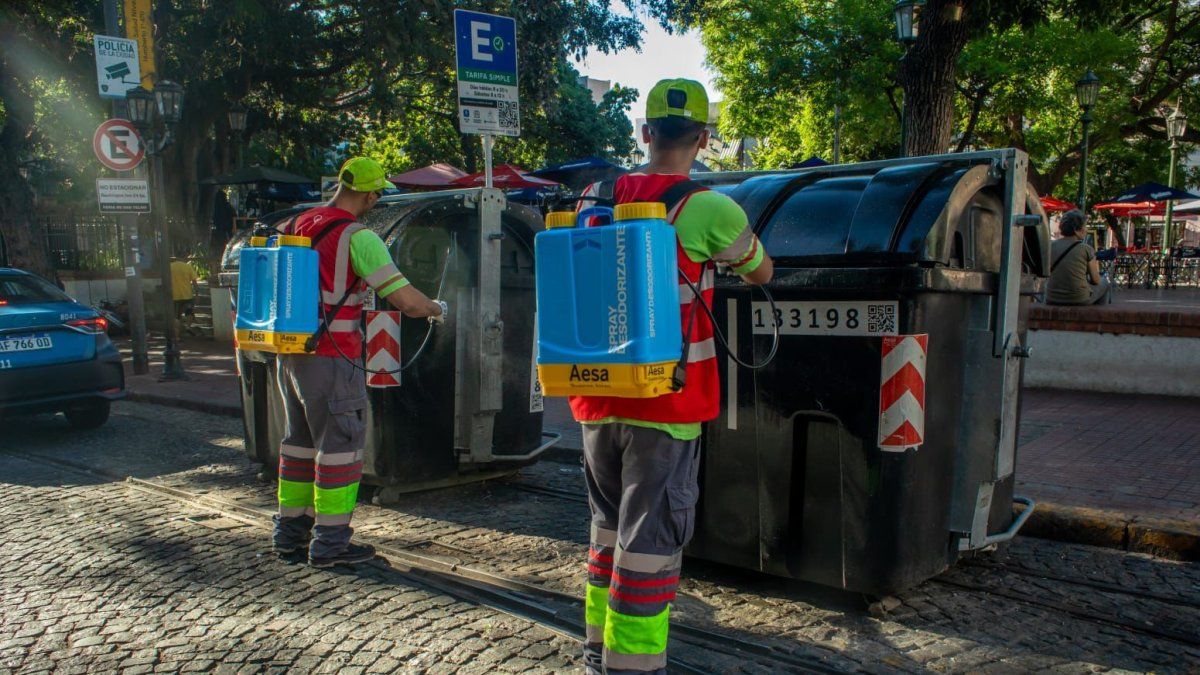The government of the City of Buenos Aires, through the Ministry of Public Space and Urban Hygienebegan this week to carry out an intensive container deodorization program in the 15 communeswith crews that tour the city, spraying devices that contain waste and its locations with a liquid odor inhibitorspecially developed for this type of spaces.
The action itself is carried out urban hygiene workers for each collection area (6 zones in total) equipped with a spray backpack containing 16 liters of a product called “Odormatic”an inhibitor that neutralizes bad odors and adds a lemon fragrance.
“We know that during the summer the smell of garbage can be more intense than during the rest of the year, that is why we added this initiative that seeks neutralize and inhibit potential bad odors from containers. In this era, it is essential Let the neighbors also do their part taking out the garbage in closed bags every day from 7 to 9 p.m., except Saturdays, and depositing them inside the black or gray containers,” he said. Ignacio BaistrocchiMinister of Public Space and Urban Hygiene.
“This simple action facilitates the collection, avoids bad odors and collaborates with city cleaning operationsincluding proper washing of containers, street sweeping, pest control and maintenance of sewers to avoid possible flooding in case of a storm,” Baistrocchi added.
Urban Hygiene Service
The city has a total of 33,045 containers throughout its territory: 28,456 black and gray and 4,589 greenwhich are emptied once a day, every day, except Saturdays. In some centralities, there are even service reinforcements day. Regarding cleaning, each container is cleaned at least once every 15 days.
Furthermore, the Public Urban Hygiene Service contemplate the differentiated collection of arid waste (work and demolition remains), green (pruning remains) and voluminous waste that, due to its characteristics, cannot be loaded on trucks.
All city streets are swept at least once a dayfrom Monday to Saturday, by manual or mechanical sweeping. The sweeping frequency is based on the number of people passing through the area. In high pedestrian traffic areassuch as tourism sectors, shopping centers or transfer centersis repeated during the afternoon.
He Intensive Deodorization Program It adds to the measures and initiatives that are being developed to have an increasingly cleaner city:
Intensive Cleaning Operations in the busiest areas of the city: 2020 were operational during 2024, with pressure washersintensive container washing, reinforcement of sweeping and road washing.
Eyes on the Street: inspectors who tour the city monitoring incidents
- 15,000 daily blocks
- 300,000 complaints per month
- 150 inspectors.
Inspections of gastronomic establishments: inspections of businesses, gastronomic establishments and neighborhood consortiums to improve compliance with the obligations of macrogenerators in their waste management. Between January and November of last year, 49,245 inspections, warnings and, in some cases, closures were carried out.
The response time to complaints is speeded up: we speed up citizen attention through line 147, the BOTI and the collaborative management website for any complaint or hygiene request.
Container replacement: in this management we changed black side-loading containers and improved the frequency of washing, an essential issue in waste management.
- 2,400 new containers
Disinfestation Tasks: we carry out disinfestation tasks in all the communities of the City throughout the year, to prevent the spread of mosquitoes that could affect the quality of life of the neighbors. These tasks include dengue preventive; wild mosquito operation; other insects: cockroaches, bed bugs, etc.
- 20,893 disinfestation operations.
Source: Ambito
I am an author and journalist who has worked in the entertainment industry for over a decade. I currently work as a news editor at a major news website, and my focus is on covering the latest trends in entertainment. I also write occasional pieces for other outlets, and have authored two books about the entertainment industry.




